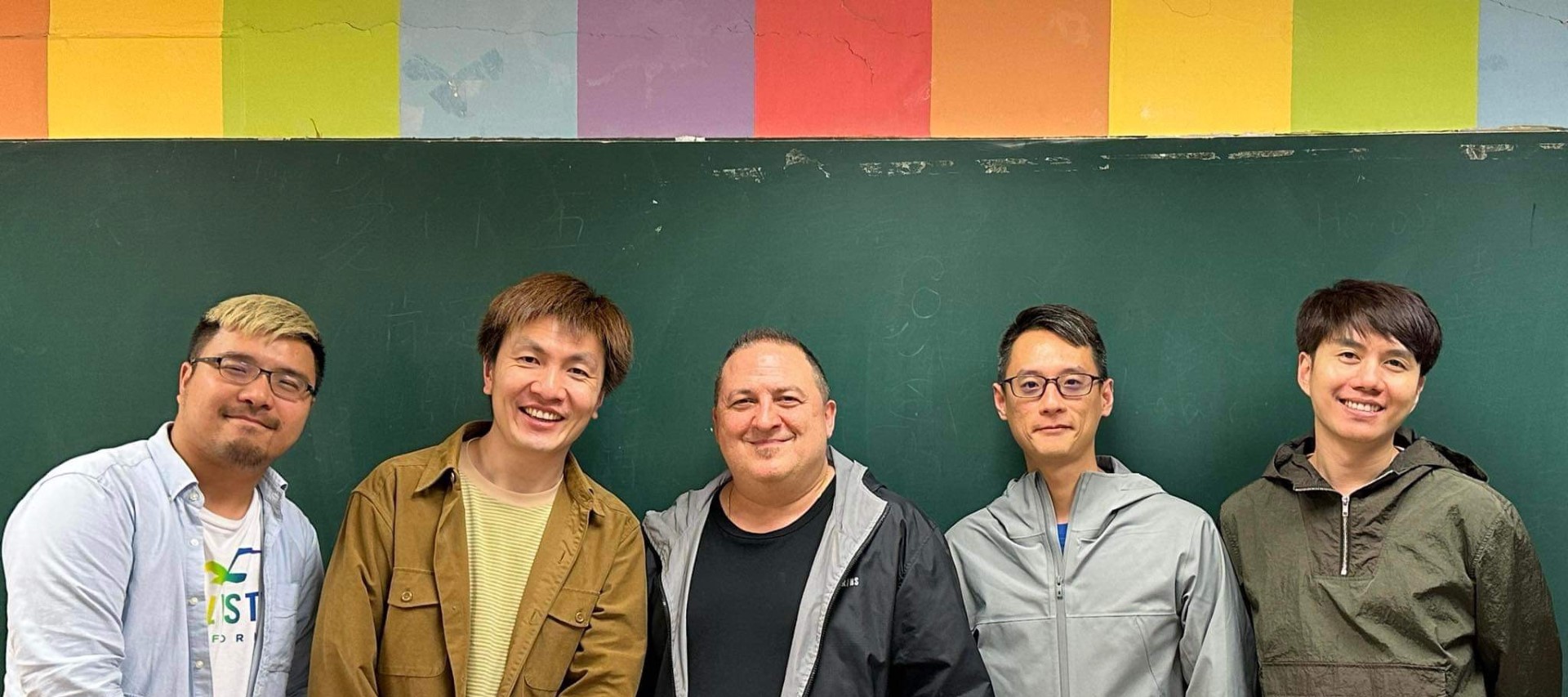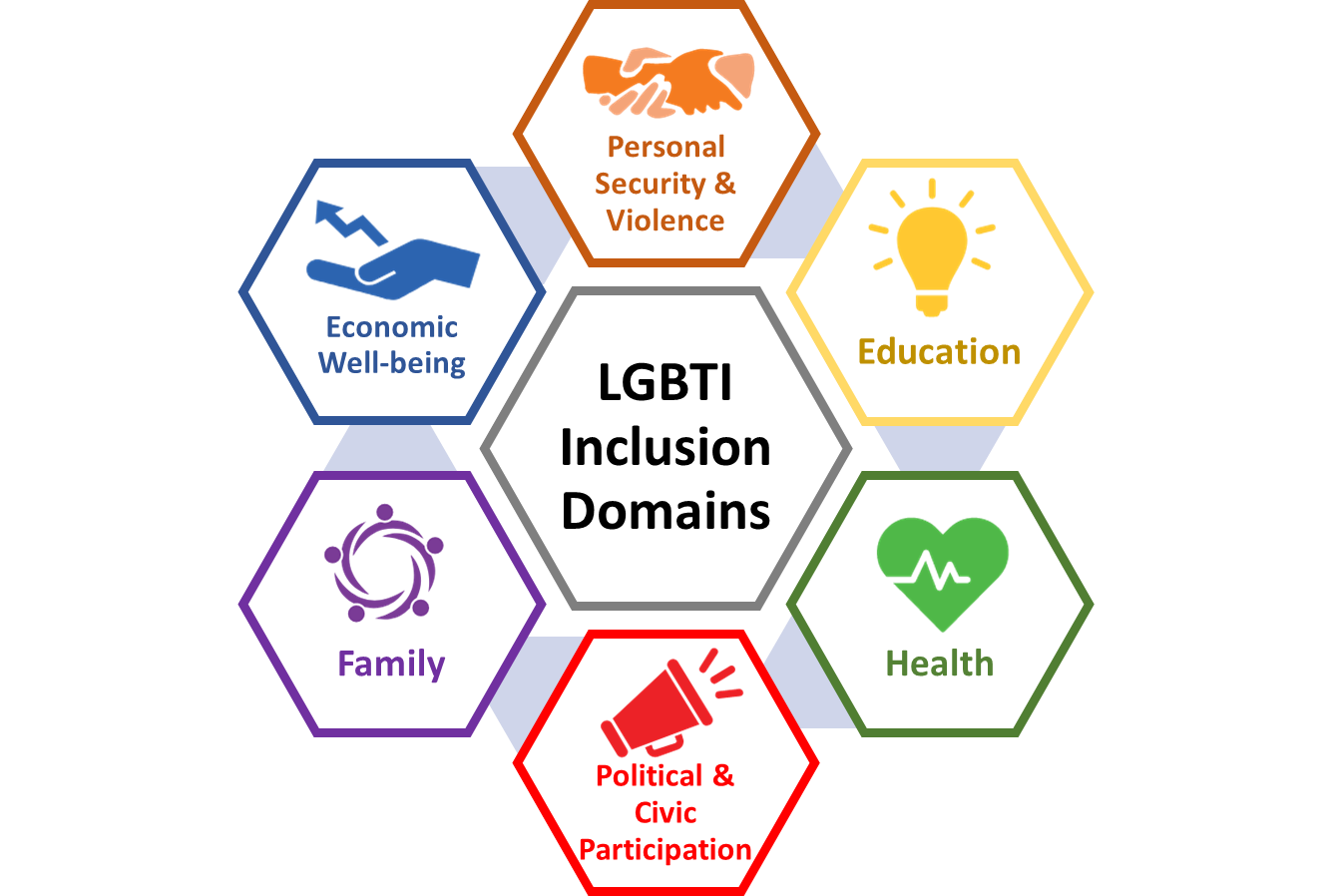Research on LGBTIQ inclusion in Asia is advancing human rights and addressing the root causes of HIV
Categories: Faculty, Peter Newman, Research
FIFSW Professor Peter A. Newman, centre, with (from left) Chia-Wei Shiu, Director of Community Resources, Tongzhi Hotline; Chih-Liu Peng, Vice Secretary General, Taiwan Tongzhi (LGBTQ+) Hotline Association; Deng-Min Chuang, Assistant Professor, National Taiwan Normal University (and FIFSW Alum); Suchon Tepjan, Research Manager, VOICES-Thailand Foundation
After more than two decades spent studying HIV prevention among sexual and gender minorities in Asia and North America, Peter A. Newman is well-acquainted with the factors that increase vulnerability to HIV infection: discrimination, stigma, violence, and marginalization in education and employment, to name just a few. Now he’s investigating those root causes directly, through a global partnership that’s advancing LGBTIQ inclusion and human rights in the region.
“While individual health behaviour is a critical area of HIV research, we’re focusing on the social and structural conditions that place people at higher risk,” says Newman, a professor at U of T’s Factor-Inwentash Faculty of Social Work. “In Canada, with progressive support for LGBTIQ rights, we may forget that consensual adult same-sex acts remain criminalized in 64 countries and punishable by death in 6 countries — monumental obstacles to accessing healthcare.”
 Newman is the lead researcher on a multidisciplinary team made up of collaborators from the social sciences, medicine, fine arts, community-based organizations, and UN agencies. The Partnership, called Mobilizing for a Research Revolution to Ensure LGBTIQ Inclusion in Asia (MFARR-Asia), is gathering data on the degree to which LGBTIQ people enjoy full and free participation in the economic, social and political life of India, Thailand, Bangladesh, Hong Kong and Taiwan.
Newman is the lead researcher on a multidisciplinary team made up of collaborators from the social sciences, medicine, fine arts, community-based organizations, and UN agencies. The Partnership, called Mobilizing for a Research Revolution to Ensure LGBTIQ Inclusion in Asia (MFARR-Asia), is gathering data on the degree to which LGBTIQ people enjoy full and free participation in the economic, social and political life of India, Thailand, Bangladesh, Hong Kong and Taiwan.
In general, Asia — home to 60% of the world’s population — lags in human rights protections for LGBTIQ people compared to Western nations.
“The only way we’re going to end the HIV epidemic is if sexual and gender minorities are no longer excluded and stigmatized in mainstream systems and laws,” says Newman. “We’re focusing on inclusion because the ability of LGBTIQ people to participate fully and equally in society is fundamental to health and human development, yet is understudied and lacks data.”
MFARR’s overarching aims are to create an evidence base on the state of inclusion of LGBTIQ populations in each society, and then use that data to identify research gaps, inform community-engaged interventions, and advocate for government programs and policies to protect and ensure human rights.
Despite launching just before the pandemic, MFARR has already had a significant impact in the region. In India, for example, Newman has been working with his research collaborator, Dr. Venkatesan Chakrapani, and community partners such as The Humsafar Trust for over 20 years. MFARR co-sponsored India’s first public-facing national LGBTIQ health symposium and co-authored the subsequent symposium report and action plan, which led to the landmark inclusion of gender affirming hormone therapy and surgery in the Prime Minister of India’s Health Insurance plan. “This expands health insurance coverage among the estimated 4.8 million trans people across India, including access to gender affirming care,” says Newman.
India’s Ministry of Health also endorsed the symposium report recommendation to develop and implement anti-discrimination policies for LGBTIQ people across government healthcare. “The road to implementation for both of these policies will be bumpy, and communities will still have to advocate, but the policies have real teeth now,” Newman says.
Meaningful engagement with community partners is embedded in every aspect of MFARR’s work. “There are always things we can learn from LGBTIQ communities that don’t show up in the research literature or government policies,” says Newman. “To get the full picture, we integrate the knowledge we gain in focus groups and community forums with our strong empirical foundation on inclusion indicators.”
He points to same-sex marriage in Taiwan as an example. As the first jurisdiction in Asia to legally recognize same-sex marriage, in 2019, Taiwan demonstrated ground-breaking progress in societal inclusion. Yet community input from the Tongzhi (LGBTQ+) Hotline Association revealed challenges faced by many individuals in Taiwan, where all marriages are officially registered in local Household Bureau records. Many who would like to get married don’t exercise their right because of anticipated stigma and fear of exclusion by their own families and local communities. “We can learn from the Taiwanese experience to better anticipate implementation challenges in places like Thailand, where the Parliament has indicated initial approval for a marriage equality bill.”
MFARR’s influence is also evident in its collaborations with community organizations across the region, both through sharing research evidence to support effective programs and providing training and capacity-building for staff and volunteers.
During the pandemic, MFARR reacted quickly, knowing the heightened vulnerability of LGBTIQ communities in the absence of human rights protections. MFARR collaborated with academic and community partners to develop and test #SafeHandsSafeHearts, a peer-delivered online eHealth intervention in Bangkok and Mumbai designed to increase COVID-19 protective behaviours and reduce psychosocial distress among LGBTIQ populations. “Our team trained 50 community members as peer counselors, who reached over 850 LGBTIQ people,” says Newman. “The results were very positive, such as reducing levels of depression in participants after just a few sessions.” Now several of MFARR’s community partners, including a major HIV clinic in Bangkok and Women’s Health in Women’s Hands in Toronto, have adopted this model to expand services to thousands of clients.
MFARR’s global partners include universities, community organizations and UN agencies, with multiple funders, led by the Social Sciences and Humanities Research Council of Canada (SSHRC). “Our longtime community partners were overjoyed when we initially proposed a research program on LGBTIQ inclusion — not solely HIV focused — because they’ve always known that it was a crucial element in HIV risk and prevention, and broader LGBTIQ wellbeing,” says Newman.
The partnership is helping to build the next generation of researchers on LGBTIQ human rights issues in Asia. “Part of the vital progress we’re making in the region is through the development of our own team, students and trainees,” says Newman. Already, the partnership has provided training to over 80 students and community organization staff. “In Canada, we sometimes accept as a given our ability to openly pursue LGBTIQ scholarship and advocacy, but this is not the case in many academic institutions in Asia.”
 When Newman approached the United Nations Development Programme (UNDP), which had initiated work with the World Bank to create an LGBTI Inclusion Index, they were extremely supportive of MFARR’s work — and even provided funding for MFARR’s initial development meeting in Bangkok — because they recognized a critical need for more research and data. To date, MFARR has completed five comprehensive reviews of the research on LGBTIQ inclusion across Asia. Based on this evidence, the MFARR team built on the UNDP-World Bank work to include a new domain in the Index. Family, which is centrally important in Asia, is now proposed as a new domain, in addition to education, economic wellbeing, health, personal security and violence, and political and civic participation.
When Newman approached the United Nations Development Programme (UNDP), which had initiated work with the World Bank to create an LGBTI Inclusion Index, they were extremely supportive of MFARR’s work — and even provided funding for MFARR’s initial development meeting in Bangkok — because they recognized a critical need for more research and data. To date, MFARR has completed five comprehensive reviews of the research on LGBTIQ inclusion across Asia. Based on this evidence, the MFARR team built on the UNDP-World Bank work to include a new domain in the Index. Family, which is centrally important in Asia, is now proposed as a new domain, in addition to education, economic wellbeing, health, personal security and violence, and political and civic participation.
In preparation for a regional symposium in June, MFARR is currently surveying experts and people with lived experience in Asia and worldwide to develop and prioritize indicators of LGBTIQ inclusion in each domain.
“Something we learned a long time ago in HIV research was that if we didn’t have data, we couldn’t prove there was a problem,” says Newman. “And if we couldn’t prove there was a problem, we couldn’t get the resources to address it. Now that we’re gathering more and more evidence to demonstrate the challenges around LGBTIQ inclusion, and models of success, we’re starting to see and track progress, and real-world transformation.”
By Megan Easton
Publications
For those interested in learning more, below is a list of selected recent publications by Professor Peter A. Newman and the MFARR-Asia team.
Wong, E. M. Y, Chan, R. C. H., Suen, Y. T., Tepjan, S., & Newman, P. A. Inclusion of LGBTQ+ individuals in Hong Kong: A scoping review. Sexuality Research and Social Policy. [Accepted].
Huang YT, Hang YC. (2024). Relational well-being among lesbian, gay, and bisexual young adults in Taiwan: Before and after the legalization of same-sex marriage. Sexuality Research and Social Policy, 21:240-52.
Chakrapani, V., Newman, P. A., Shunmugam, M., Rawat, S., Mohan, B. R., Baruah, D., & Tepjan, S. (2023). A scoping review of lesbian, gay, bisexual, transgender, queer, and intersex (LGBTQI+) people’s health in India. PLOS Global Public Health, 3(4): e0001362.
Newman, P. A., Akkakanjanasupar, P., Tepjan, S., Boborakhimov, S., de Lind van Wijngaarden, J. W., & Chonwanarat, N. (2022). Peer education interventions for HIV prevention and sexual health with young people in Mekhong Region countries: A scoping review and conceptual framework. Sexual and Reproductive Health Matters, 30(1), 2129374.
Reid, L., Newman, P. A., Lau, H., Tepjan, S., & Akkakanjanasupar, P. (2022). A scoping review of LGBT+ inclusion in Thailand: Policy proposals and recommendations. Sexuality Research and Social Policy, 19, 1731-1746.
Chakrapani, V., Newman, P. A., Sebastian, A., Rawat, S., Mittal, S., Gupta, V., & Kaur, M. (2022). Mental health, economic well-being and health care access amid the COVID- 19 pandemic: A mixed methods study among urban men who have sex with men in India. Sexual and Reproductive Health Matters, 30(1): 2144087.
Chakrapani, V., Newman, P. A., Sebastian, A., Rawat, S., Shunmugam, M., & Sellamuthu, P. (2022). The impact of COVID-19 on economic well-being and health outcomes among transgender women in India [Perspectives].Transgender Health, 7(5), 381–384.
Chakrapani, V., Scheim, A. I., Newman, P. A., Shunmugam, M., Rawat, S., Baruah, D., et al. (2022). Affirming and negotiating gender in family and social spaces: Stigma, mental health and resilience among transmasculine people in India. Culture, Health & Sexuality, 24(7), 951–967.
Newman, P. A., Prabhu, S. M., Akkakanjanasupar, P., & Tepjan, S. (2022). HIV and mental health among young people in low-resource contexts in Southeast Asia: A qualitative investigation. Global Public Health, 17(7), 1200-1214.
Newman, P. A., Reid, L., Tepjan, S., & Akkakanjanasupar, P. (2021). LGBT+ inclusion and human rights in Thailand: A scoping review of the literature. BMC Public Health, 21, 1816.